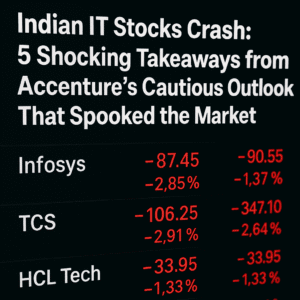Indian IT Stocks Crash: 5 Shocking Takeaways from Accenture’s Cautious Outlook That Spooked the Market
Indian IT stocks fell sharply Monday, led by Infosys, primarily due to cautious signals in Accenture’s recent results. While Accenture reported solid quarterly growth (7%) and strong Gen AI bookings ($1.5B), its lowered full-year guidance ceiling and weak near-term outlook (1-5% growth) sparked investor anxiety. A significant 7% drop in Accenture’s outsourcing deals – a core segment for Indian firms – directly fueled concerns.
However, the sell-off overlooks crucial positives: Accenture’s resilience in Financial Services (BFSI), the largest vertical for Indian IT, remains strong, and its massive AI bookings confirm robust future demand. Analysts are split, with HSBC seeing limited upside while CLSA views the dip as a potential buying opportunity, citing healthy pipelines and alignment in BFSI strength. The reaction highlights market sensitivity; long-term success hinges on Indian IT firms executing in AI and navigating near-term headwinds, not just Accenture’s quarterly noise. Investors should dig deeper than the headline drop.

Indian IT Stocks Crash: 5 Shocking Takeaways from Accenture’s Cautious Outlook That Spooked the Market
The sharp sell-off in Indian IT stocks on Monday, with Infosys leading losses and peers like TCS and HCL Tech falling 1-3%, wasn’t just a knee-jerk reaction. It was a complex market response to nuanced signals hidden within Accenture’s latest quarterly results. Here’s the deeper story:
The Trigger: Accenture’s Mixed Bag
Accenture, the global IT services bellwether, reported results that were fundamentally solid but contained cautious notes:
- Revenue Growth: Healthy 7% YoY growth for the quarter.
- Guidance Narrowing (But Lowered?): While narrowing their full-year revenue growth forecast (to 6-7% from 5-7%), the new range effectively lowered the upper end. More concerning was the weak Q4 guidance (1-5% growth), primarily attributed to a significant ~2% headwind from US Federal contracts.
- Deal Wins: Overall bookings declined 7% YoY, with a notably sharper fall in outsourcing deals – a core segment for Indian IT firms.
- The AI Bright Spot: Strong Gen AI new bookings ($1.5 billion for the quarter) and revenue ($700 million) demonstrated robust demand in this transformative area.
- BFSI Strength: Continued resilience in Financial Services, the largest vertical for most Indian IT majors.
Why Indian Stocks Reacted Negatively:
- The Guidance Shadow: The lowered top-end for the full year and the weak near-term Q4 outlook, especially citing Federal cuts, spooked investors. It signals potential pockets of weakness in core markets that Indian IT also serves deeply.
- Outsourcing Weakness: The sharp decline in Accenture’s outsourcing bookings directly mirrors a critical revenue stream for Indian firms. HSBC’s note highlighting this as having “no incremental positive read-through” resonated.
- Sentiment Sensitivity: After a tough year (Nifty IT still down 10% YTD despite a recent 4% bounce), the sector is highly sensitive to any sign of slowing global demand. Accenture’s cautious tone amplified existing concerns about discretionary spending and budget tightening, particularly in certain geographies.
The Bullish Counterpoint: Not All Doom and Gloom
CLSA provided a crucial counterbalance, retaining its positive stance:
- BFSI Alignment: Accenture’s strength in Financial Services directly aligns with positive commentary from major Indian IT players about this key vertical, suggesting underlying demand remains firm in a critical sector.
- Pipeline Perspective: CLSA interpreted the lower end of Accenture’s Q4 guidance as stemming from timing issues within a strong booking pipeline, not a fundamental demand collapse. This implies potential growth deferred, not destroyed.
- Gen AI Momentum: Accenture’s massive Gen AI bookings ($1.5B) validate the immense market potential. Indian IT firms, heavily investing in AI capabilities, are well-positioned to capture a significant share of this burgeoning market longer-term. The $700M in current AI revenue shows monetization is real.
- Valuation Opportunity: The YTD underperformance might present selective buying opportunities for firms demonstrating strong execution in high-growth areas like AI and cloud, despite near-term macro headwinds. CLSA’s “outperform” ratings on Infosys, Tech Mahindra, and Persistent Systems reflect this view.
The Human Insight: Navigating Uncertainty
The market’s reaction highlights the tightrope Indian IT walks:
- Global Proxy: Accenture remains a vital indicator, making Indian stocks vulnerable to its signals, justified or not.
- Diverging Views: The HSBC vs. CLSA split underscores genuine uncertainty. Is this a temporary blip driven by specific factors (like Federal cuts), or the leading edge of a broader slowdown?
- AI: Hope vs. Hype: While Gen AI is a massive future driver, its current contribution ($700M for Accenture) is still small compared to overall revenues. Investors need patience to see this translate meaningfully to Indian IT bottom lines.
- Execution is Key: In this environment, companies demonstrating cost discipline, client mining in resilient sectors like BFSI, and tangible progress in capturing AI/cloud deals (like Accenture’s $1.5B booking) will likely differentiate themselves.
The Bottom Line for Investors:
Don’t read Monday’s fall as a simple verdict on Indian IT. It’s a reaction to heightened uncertainty reflected in Accenture’s cautious near-term outlook and outsourcing weakness. However, underlying strengths remain:
- Solid performance in the crucial BFSI vertical.
- Explosive growth potential in Gen AI.
- Attractive valuations relative to recent history for some players.
The path forward demands vigilance. Focus on company-specific execution, their exposure to resilient industries, concrete progress in AI delivery, and management commentary in the upcoming earnings season. The Accenture report sets a cautious tone, but it doesn’t erase the long-term digital transformation thesis underpinning the sector. The winners will be those who navigate the near-term headwinds while aggressively positioning for the AI-driven future.
You must be logged in to post a comment.